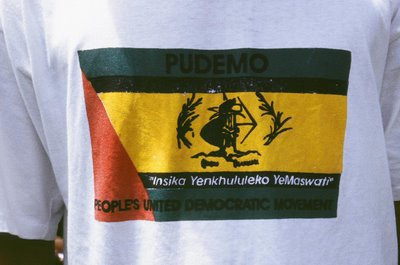Kwaluseni, Swaziland
March 2, 1996
Endorsed by political and non-political organisations representing the churches, students, unions, employers, farm dwellers, street vendors, political parties, human rights, education, and many more.
SWAZILAND DEMOCRATIC ALLIANCE
UMSHUCO WENKHULULEKO YEMASWATI
On Saturday 02 March 1996, different civic formations, political and non-political, met at the University of Swaziland to discuss the current political situation and have agreed to form the above democratic alliance and adopted the KWALUSENI DECLARATION.
The formations were motivated by the failure of the Tinkhundla system to be responsible to the needs of the people in particular the down trodden which has encouraged a system of governance which takes care of the chosen few at the expense of the entire taxpayers.
The system lacks accountability, transparency, democracy and all the elements of good governance. It has become a beehive of corruption and has got no vision of the future and lacks in competition for investor confidence.
Since the establishment of this alliance a lot of civic formations both political and non-political are continually joining the alliance. They are all motivated by the need to participate in the determination of their destination.
All formations have been asked to submit two names to participate in a national co-ordination committee. Contact persons are Cde Jerry Nxumalo and Tom Dlamini.
THE KWALUSENI DECLARATION
The Preamble
We, the representatives mandated by the following political organisations and civic formations and groupings: The People's United Democratic Movement (PUDEMO), The Swaziland Youth Congress (SWAYOCO), The Swaziland Federation of Trade Unions (SFTU), The Swaziland Association of Students (SAS), The Swaziland National Ex-Miners Co-operative Union, Forward to the Future Forum (FFF), Institute of Democracy and Leadership (IDEAL), Human Rights Association of Swaziland (HUMARAS), Church Organisations, Indigenous Business, Atibuye Emasisweni National Forum, Butimba Bemaswati and concerned citizens. Inspired by the love, responsibility and patriotism towards our country and people, and recognising that Swaziland belongs to all citizens regardless of race, colour, creed or gender, resolved the following:
- That the shaping of our socio-political future, constitutional content and economic direction, is not the exclusive domain of any single family but a responsibility of all citizens of our country regardless of their station in life.
- And has succeeded to breed corruption, social divisions, inefficiency in the operation of government, power struggles between the formal government in Mbabane, informal one in Lobamba, created a powerful clique of princesses and other shadowy groups and individuals who are not only draining the economy of the country in the name of the King but are also selfish. That the Tinkhundla system or model of government has failed dismally pushing our king and country in a direction of civil war and economic destitution just to protect their own interests.
- That the institution of the Monarch, revered and respected by the majority of Swazis, should be protected and every effort should be employed to save and rescue it from the hands of cabals and be elevated to a sovereignty position that is above party politics.
- That the king and the queen mother should be placed above corruption, politics and the general performances of any government or individuals and should serve as a national symbol of unity and nationhood.
- That the destiny of Swaziland, its constitutional, political system, general international relations, economic development should be shaped (open to) all its citizens and their political or non-political organisations, formations and groups.
- That the revocation of the 1973 King's Decree is fundamental to the normalisation of the situation and empowering of individuals and political and non political organisations, formations and groups to participate in all the facets of our political, constitutional and economical life without fear or intimidation.
- That the restoration of the fundamental Bill of Rights and the independence of the judiciary are an important element of assuring freedom of speech and assembly, freedom to organise, freedom to choose to belong or not to belong to any political or non political organisation, formation or group. These rights are also important in the development and maintenance of a strong, vibrant, transparent, accountable and participative government.
To these end therefore, conscious of our dilemma in which our country finds itself, and mindful of duties and responsibilities as citizens of our beloved country, and determined to achieve peace, justice, freedom and the pursuit of happiness have decided to unite all our efforts, resources and energies to ensure that:
(a) a peaceful solution is found to resolve the crisis regarding our political future;
(b) whilst not interfering with the independence and separate identities of the affiliating organisations, to combine our efforts to ensure that;
(i) our King is not left at the hands of greedy and selfish cabals during this process of change;
(ii) the majority of the citizens participate and cast their views without fear or intimidation in the debate on the democratisation of the country;
(iii) the democratisation process becomes non-reversible and is understood, protected by the people of Swaziland and the international community;
(iv) freedom of speech and assembly is immediately guaranteed with the removal of the King's Decree of 1973 and the concurrent removal of press restrictions;
(v) the constitutional conference or commission is as representative and participative as possible and has in built mechanisms for feedback to the political and non-political organisations, formations and groups represented.
Further, all parties in this forum have equal status and power. The forum resolves issues by consensus and compromise;
(vi) The constitution drawn up by this forum can only be an interim arrangement to enable the first democratic elections to be conducted.

No comments:
Post a Comment